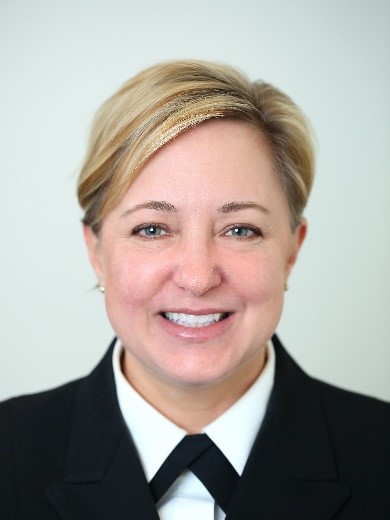
Summer 2019
Aiming High: A Profile of SBM Member and U.S. Public Health Service Captain Christine Hunter, PhD
Margaret Schneider, PhD; SBM Member Delegate

Christine Hunter, PhD., ABPP
Perhaps you have wondered about the professional path that has led some of our behavioral medicine colleagues to prominent positions at the National Institutes of Health (NIH). Maybe you noticed some SBM members in uniform, and wondered about the role of behavioral medicine in the military. Or maybe you were fortunate enough to have a really fantastic Program Officer at the NIH who made you realize that within that large government entity there reside a number of truly talented, caring, and inspirational individuals eager to do what they can to move behavioral medicine science forward. For all of these reasons and more I decided to use this space in Outlook to present the highlights of an interview that I conducted with Captain Christine Hunter, PhD, ABPP, of the U.S. Public Health Service, who is currently the Deputy Director of the Office of Behavioral and Social Sciences Research (OBSSR) at the NIH.
When I asked Dr. Hunter to describe her professional path, she described it in terms of a series of opportunities that opened up because she kept her options open. Trained as a clinical psychologist, she has kept her license active throughout more than 20 years of employment as she has followed a trajectory that has gradually moved farther away from clinical practice. This strategy has afforded her numerous chances to take on new professional challenges, including running the behavioral medicine clinic and clinical programing at the inpatient clinic at Keesler Air Force Base in Mississippi soon after her internship in clinical psychology. Dr. Hunter feels that her decision to join the Air Force provided a wide range of career options and opportunities which resulted in her eventual appointment as the Director of Behavioral Research at the National Institute of Diabetes and Digestive and Kidney Diseases (NIDDK); a position she held for 11 years.
At NIDDK, Dr. Hunter found that the NIH culture suited her perfectly. She considers herself a collaborative scientist, and found that the NIH is an ideal place to be if you value being part of a team, juggling lots of different responsibilities, and influencing science from the 10,000 foot view. She cautions that the NIH is not the best place to be if you are the type of person that wants to take a project from beginning to end and have it done solely under your direction, yet she is quick to emphasize that working at the NIH is both deeply rewarding and scientifically challenging. Her job has involved mentoring junior investigators, supporting senior investigators as they shape the field, bringing together the top minds in behavioral medicine to address timely issues, and consensus building among her colleagues to move toward a product.
Throughout her remarkable career, Dr. Hunter has looked toward SBM as her professional home. In over 25 years of membership, she has rarely missed an Annual Meeting, and she always looks forward to the presidential addresses as a chance to watch people at the top of their field give back and demonstrate their belief in the organization. For SBM members interested in a career with NIH, Dr. Hunter wants to emphasize that there is much to recommend this professional pathway. The most common time to make this shift is soon after fellowship or mid-career, after one has demonstrated a capability for critical thinking and has achieved some independent scientific experience. Dr. Hunter’s own transition to her current position as Deputy Director of OBSSR was the organic result of a lifetime of keeping her options open and enthusiastically embracing each new challenge, and to hear her describe her work, it is clear that she could not be happier.